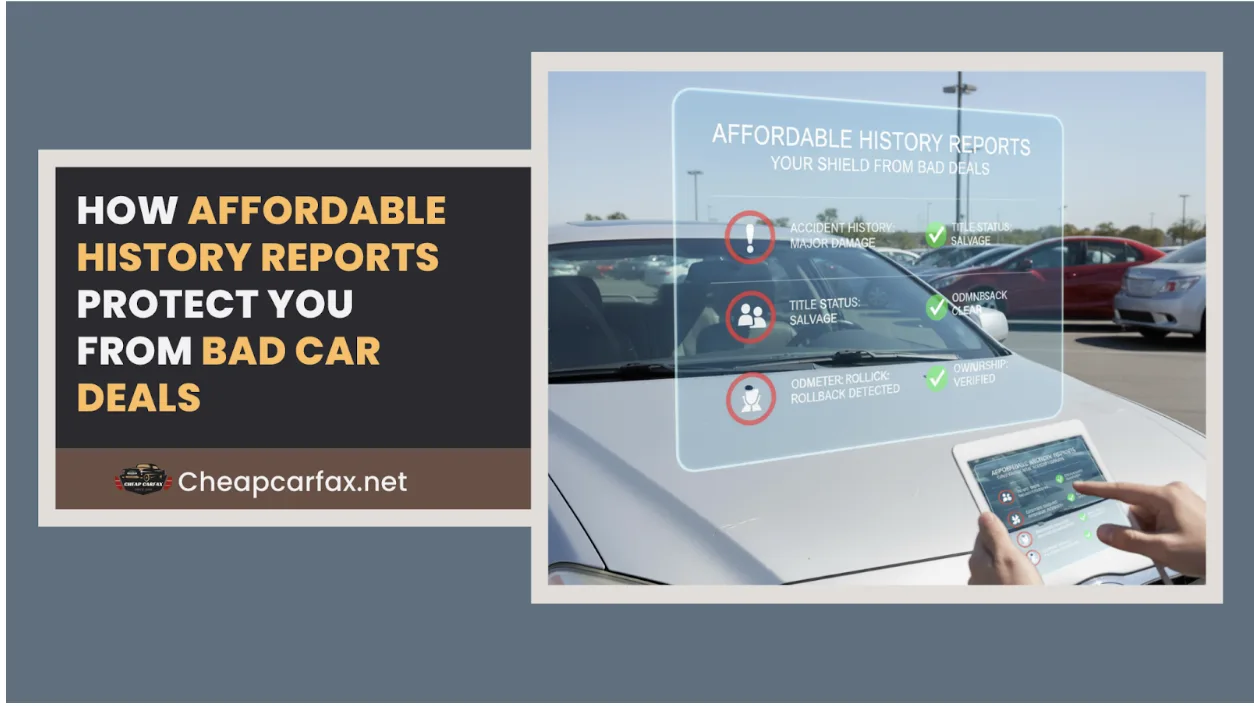How Affordable History Reports Protect You from Bad Car Deals
A used car can look perfect, sound smooth, and still carry secrets that drain your wallet later. Affordable history reports give buyers the power to spot these issues before signing papers. They cost less than premium options like Carfax but still provide the key facts you need to avoid bad car deals.
Why Car History Matters
A car can look perfect from the outside and still hide damage inside. Floods, crashes, unpaid loans, and odometer fraud are common. Dealers may not share these details unless asked. A history report shows the truth.
Without this record, buyers gamble. You might buy a car that seems fair, only to face costly repairs weeks later. Affordable reports remove much of this risk.
What is an Affordable History Report?
An affordable history report is a low-cost version of a vehicle background check. These reports collect data from many sources, such as:
- State DMV records
- Police accident reports
- Insurance claims
- Service and repair shops
- Odometer readings
The report then compiles all this into one file. You see past owners, accidents, title status, and more. While they cost less than Carfax, many give the same crucial details.
The Dangers of Skipping a History Report
Skipping a report can turn a cheap deal into a nightmare. Problems often include:
- Hidden crash repairs that weaken safety
- Odometer rollbacks that hide mileage
- Flood damage that leads to rust and wiring failure
- Cars with active liens that you may be forced to pay
- Stolen vehicles with fake titles
Once you buy the car, these become your problems. Returning a used car is rarely easy.
How Reports Protect Buyers
Affordable reports give you the facts to say yes or no with confidence. They protect in three main ways:
1. Spotting Accident Damage
Many sellers fix cars after a crash and repaint them. Damage to the frame or airbags may not show at first glance. Reports reveal crash history. If a car has been in several accidents, you can walk away.
2. Checking Title Status
Some cars have “salvage” or “rebuilt” titles. This means the car was once declared a total loss. Even if it drives now, resale value and safety are low. A report will flag this so you do not pay too much.
3. Verifying Mileage
Odometer fraud still happens. Sellers may roll back numbers to make cars seem newer. A history report lists mileage at each inspection, so you can spot fake changes.
4. Revealing Flood or Fire Damage
Flooded cars may run for months before breaking down. Rust spreads, and wiring shorts out. History reports check for flood claims or insurance payouts. This protects buyers in flood-prone states.
5. Confirming Ownership and Liens
If a car still has an unpaid loan, the bank may repossess it. A report confirms if the title is clean and free of debt.
Affordable vs. Premium Reports
Some buyers think only Carfax or AutoCheck matter. But affordable reports cover most of the same ground. They may not have every detail, but they provide enough to spot red flags.
Benefits of affordable reports:
- Lower cost, often under $20
- Clear layout with key facts
- Fast access online
- Reliable data sources
They give budget buyers peace of mind without draining money.
When to Use a History Report
Use a report whenever you plan to buy a car that is not new. This includes:
- Cars from private sellers
- Cars from small dealers
- Cars sold at auctions
- Online marketplace listings
Even if you trust the seller, still check. Trust does not replace proof.
Pair Reports with Inspections
A history report does not show every detail. Some problems only appear with a mechanic’s inspection. Combine both steps:
- Order a report.
- If the report looks clean, hire a mechanic to inspect.
- Use both to decide if the deal is fair.
This process reduces almost all risks.
How Reports Save Money
Spending a small fee on a report can save thousands later. For example:
- A $15 report might show $5,000 of crash repairs.
- It may reveal a salvage title that cuts the car’s resale by half.
- It may show a rollback that adds years of hidden wear.
By walking away, you save money and stress.
Common Red Flags in Reports
When reading reports, watch for these warnings:
- Multiple owners in a short time
- Accidents listed every few years
- Mileage gaps or drops
- Title changes across states
- “Lemon” law buyback
One or two may not be a deal breaker, but too many should end the deal.
Why Affordable Options Are Growing
More buyers now search online before buying cars. They want cheaper, faster ways to check vehicles. Affordable report services meet this demand. Many sellers also know buyers will ask, so they prepare clean reports upfront.
This growth means buyers have more tools than ever. With low cost and wide access, skipping a report is no longer smart.
How to Get an Affordable History Report
The process to get an affordable history is way simple:
- Find the VIN (Vehicle Identification Number) on your vehicle. It has 17 characters.
- Go to a trusted affordable report site.
- Enter the VIN in the search box.
- Pay the small fee.
- Download the report instantly.
You can also check packages if you plan to shop several cars. Many sites sell bulk options.
Final Tips for Safe Car Buying
- Never buy without checking a history report.
- Always compare at least two vehicles.
- Ask the seller questions about any red flags.
- Use the report to bargain on price if minor issues appear.
- No VIN, no deal. If the seller refuses, it’s safer to leave.
Conclusion
Bad car deals can drain savings and cause endless repair stress. Affordable history reports give buyers the facts they need to avoid these traps. They cost less than premium reports but still cover the major risks like crashes, flood damage, and title fraud. Combined with a mechanic’s inspection, they form a strong shield against hidden problems.
Before you sign for that used car, spend a little on a history report. It could save you thousands and give you the peace of mind you deserve behind the wheel.
Media Details:
CheapCarfax
Country: United States
Contact: support@cheapcarfax.net





